Fall: the American term for autumn is so much more apt.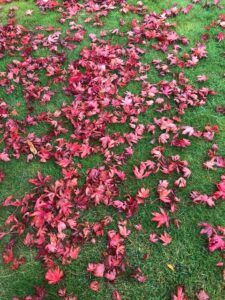 This month I want to explore a couple of ways that plants figure in this season, beyond pumpkins at Halloween.
This month I want to explore a couple of ways that plants figure in this season, beyond pumpkins at Halloween. As we enter a second lockdown in the UK, I also suggest seeing autumn as the start of the new growing season might help our mental health too. Gardens helped a lot of us survive in April and they can help us again during the winter months.
As we enter a second lockdown in the UK, I also suggest seeing autumn as the start of the new growing season might help our mental health too. Gardens helped a lot of us survive in April and they can help us again during the winter months.
This picture of my local woods yesterday reminded me of two biological phenomena that never fail to amaze me every autumn; leaves change from green into so many beautiful colours and, the thick carpet of leaf litter will miraculously disappear before long. 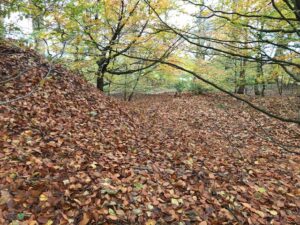 How does all that work? Leaf colours change when the plant does a stock-take of its pigments, conserving some over winter and discarding others in leaf fall. The Woodland Trust’s webpage is one of many sites with autumn activities and further information https://www.woodlandtrust.org.uk/blog/2020/10/why-autumn-leaves-change-colour/
How does all that work? Leaf colours change when the plant does a stock-take of its pigments, conserving some over winter and discarding others in leaf fall. The Woodland Trust’s webpage is one of many sites with autumn activities and further information https://www.woodlandtrust.org.uk/blog/2020/10/why-autumn-leaves-change-colour/
What about leaf litter? This will all degrade into soil 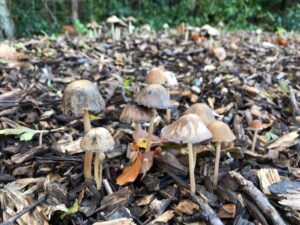 by the actions of fungi, bacteria and invertebrates. This Scientific American article provides a structured activity for looking at leaf litter degradation in autumn. If you’re looking for an outdoor activity during lockdown, this could easily be adapted to look at soils in your garden. https://www.scientificamerican.com/article/bring-science-home-leaf-litter-biodiversity/
by the actions of fungi, bacteria and invertebrates. This Scientific American article provides a structured activity for looking at leaf litter degradation in autumn. If you’re looking for an outdoor activity during lockdown, this could easily be adapted to look at soils in your garden. https://www.scientificamerican.com/article/bring-science-home-leaf-litter-biodiversity/
How can autumn be the start of the growing year? Of course most plants will be dormant or grow slowly over winter but now is the time that we can all think about next year’s growing seasons and prepare for it. 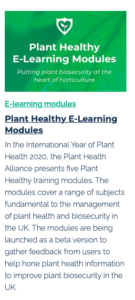 Looking after the plants we have and planning for what we want to grow next year for food or pleasure takes a little time to do properly and we don’t have to wait for the spring rush to do this. Many garden centres and retailers are increasing the amount of helpful advice they provide online and the horticultural trade association now operates a Plant Healthy Scheme to help everyone protect plants from pests and diseases. This month, 5 free training modules were made available https://planthealthy.org.uk/resources; you’ll find some input from me in module 5.
Looking after the plants we have and planning for what we want to grow next year for food or pleasure takes a little time to do properly and we don’t have to wait for the spring rush to do this. Many garden centres and retailers are increasing the amount of helpful advice they provide online and the horticultural trade association now operates a Plant Healthy Scheme to help everyone protect plants from pests and diseases. This month, 5 free training modules were made available https://planthealthy.org.uk/resources; you’ll find some input from me in module 5.
My final point relates to mental health. 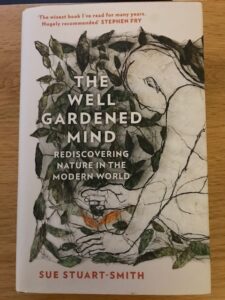 It’s completely understandable that many people will view a second lockdown negatively, with journalists reminding us often that we are missing out on holidays and potentially family Christmases too, even without mentioning the horrendous economic consequences for so many. Personally I find it easier to manage the hard times if I can find something to feel good about and doing my bit to protect plant health while enjoying the autumn season certainly helps. I also read this book recently which I thoroughly recommend; it’s full of stories and further reading of how people have survived troubled times by engaging with their gardens and local environments.
It’s completely understandable that many people will view a second lockdown negatively, with journalists reminding us often that we are missing out on holidays and potentially family Christmases too, even without mentioning the horrendous economic consequences for so many. Personally I find it easier to manage the hard times if I can find something to feel good about and doing my bit to protect plant health while enjoying the autumn season certainly helps. I also read this book recently which I thoroughly recommend; it’s full of stories and further reading of how people have survived troubled times by engaging with their gardens and local environments.
